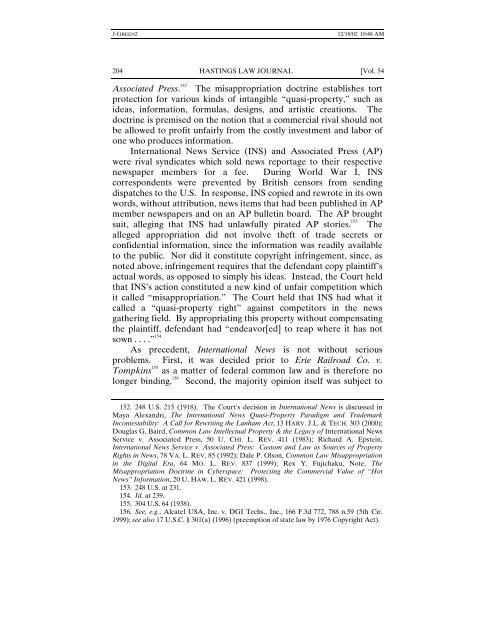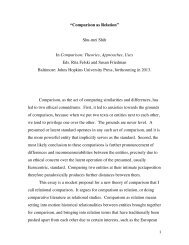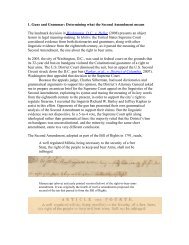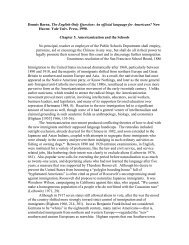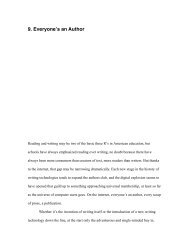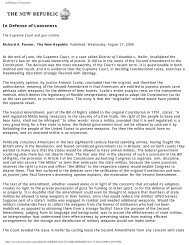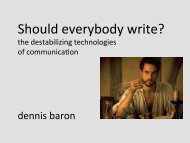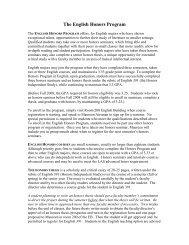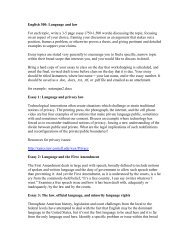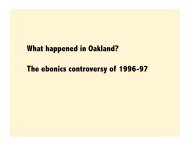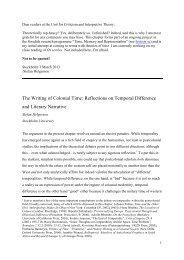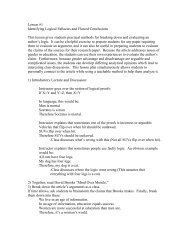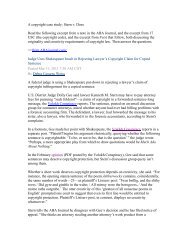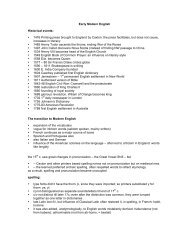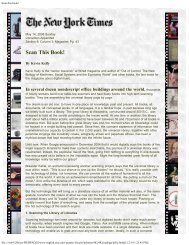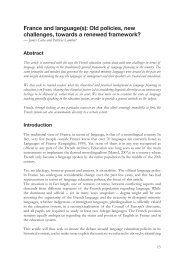Plagiarism, Norms, and the Limits of Theft Law: Some ... - English
Plagiarism, Norms, and the Limits of Theft Law: Some ... - English
Plagiarism, Norms, and the Limits of Theft Law: Some ... - English
Create successful ePaper yourself
Turn your PDF publications into a flip-book with our unique Google optimized e-Paper software.
J-GREEN2 12/18/02 10:48 AM<br />
204 HASTINGS LAW JOURNAL [Vol. 54<br />
Associated Press. 152 The misappropriation doctrine establishes tort<br />
protection for various kinds <strong>of</strong> intangible “quasi-property,” such as<br />
ideas, information, formulas, designs, <strong>and</strong> artistic creations. The<br />
doctrine is premised on <strong>the</strong> notion that a commercial rival should not<br />
be allowed to pr<strong>of</strong>it unfairly from <strong>the</strong> costly investment <strong>and</strong> labor <strong>of</strong><br />
one who produces information.<br />
International News Service (INS) <strong>and</strong> Associated Press (AP)<br />
were rival syndicates which sold news reportage to <strong>the</strong>ir respective<br />
newspaper members for a fee. During World War I, INS<br />
correspondents were prevented by British censors from sending<br />
dispatches to <strong>the</strong> U.S. In response, INS copied <strong>and</strong> rewrote in its own<br />
words, without attribution, news items that had been published in AP<br />
member newspapers <strong>and</strong> on an AP bulletin board. The AP brought<br />
suit, alleging that INS had unlawfully pirated AP stories. 153 The<br />
alleged appropriation did not involve <strong>the</strong>ft <strong>of</strong> trade secrets or<br />
confidential information, since <strong>the</strong> information was readily available<br />
to <strong>the</strong> public. Nor did it constitute copyright infringement, since, as<br />
noted above, infringement requires that <strong>the</strong> defendant copy plaintiff’s<br />
actual words, as opposed to simply his ideas. Instead, <strong>the</strong> Court held<br />
that INS’s action constituted a new kind <strong>of</strong> unfair competition which<br />
it called “misappropriation.” The Court held that INS had what it<br />
called a “quasi-property right” against competitors in <strong>the</strong> news<br />
ga<strong>the</strong>ring field. By appropriating this property without compensating<br />
<strong>the</strong> plaintiff, defendant had “endeavor[ed] to reap where it has not<br />
sown . . . .” 154<br />
As precedent, International News is not without serious<br />
problems. First, it was decided prior to Erie Railroad Co. v.<br />
Tompkins 155 as a matter <strong>of</strong> federal common law <strong>and</strong> is <strong>the</strong>refore no<br />
longer binding. 156 Second, <strong>the</strong> majority opinion itself was subject to<br />
152. 248 U.S. 215 (1918). The Court’s decision in International News is discussed in<br />
Maya Alex<strong>and</strong>ri, The International News Quasi-Property Paradigm <strong>and</strong> Trademark<br />
Incontestability: A Call for Rewriting <strong>the</strong> Lanham Act, 13 HARV. J.L. & TECH. 303 (2000);<br />
Douglas G. Baird, Common <strong>Law</strong> Intellectual Property & <strong>the</strong> Legacy <strong>of</strong> International News<br />
Service v. Associated Press, 50 U. CHI. L. REV. 411 (1983); Richard A. Epstein,<br />
International News Service v. Associated Press: Custom <strong>and</strong> <strong>Law</strong> as Sources <strong>of</strong> Property<br />
Rights in News, 78 VA. L. REV. 85 (1992); Dale P. Olson, Common <strong>Law</strong> Misappropriation<br />
in <strong>the</strong> Digital Era, 64 MO. L. REV. 837 (1999); Rex Y. Fujichaku, Note, The<br />
Misappropriation Doctrine in Cyberspace: Protecting <strong>the</strong> Commercial Value <strong>of</strong> “Hot<br />
News” Information, 20 U. HAW. L. REV. 421 (1998).<br />
153. 248 U.S. at 231.<br />
154. Id. at 239.<br />
155. 304 U.S. 64 (1938).<br />
156. See, e.g., Alcatel USA, Inc. v. DGI Techs., Inc., 166 F.3d 772, 788 n.59 (5th Cir.<br />
1999); see also 17 U.S.C. § 301(a) (1996) (preemption <strong>of</strong> state law by 1976 Copyright Act).


